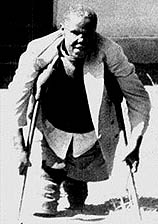Classic DACB Collection
All articles created or submitted in the first twenty years of the project, from 1995 to 2015.Zulu, Salakwandza

Salakwandza Zulu fell into bad company while working in Johannesburg. He wasted money on drinking, gambling and expensive clothes. When he went to church he would wait until the preaching started and then clump in noisily with heavy shoes. Becoming unemployed he lived on food he found in garbage bins. Still he drank heavily. Finally he arrived back home in eswatini.
Some Swazi friends were making easy money so he thought he would try it. He and a friend bought clerical collars and black suits. They filled pillow slips with dagga (marijuana) and sprayed them with perfume to kill the smell. Dressed as ministers of religion they took the train to Johannesburg sitting comfortably in a second class compartment and pretending to read newspapers. Their luggage was not examined while others were caught with drugs. He was not aware that he was doing wrong.
While in Johannesburg he became very sick and doctors found that he had leprosy. Back in eswatini he was an outcast at home so he went to live with a group of lepers at Encabaneni. From his home it was two days of walking in the rain and sleeping in the open. No one would give him shelter. At the camp he encountered many difficulties and much physical suffering. He would soon have died there.
One day some Christians came and held a service for them and he was convicted of his sin. He came to Thembelihle (Good hope), the Mbuluzi Leper Colony near Mbabane, operated from 1948 by the Nazarene Mission. Zulu was one of the first to arrive at the Colony hospital. He came by ambulance. He had lost one leg and he eventually lost his sight, but he found fine Christian friends and was well cared for. He praised the Lord, certain he would see Jesus face to face when he died.
When his second leg had to be amputated, those watching near his bedside heard him. Between sobs he was singing hymns in Zulu. He said, “Those dead feet and legs were of no use anyway. They were just in the way. I am glad they are gone.”
When the stump healed, he began crawling on all fours. Then an amazing thing happened. At first he kept falling and trying again and again but finally he learned to walk on the stumps. Eventually a special pair of boots was made for him to wear over his stumps. All through his trials he often sang hymns and choruses. Zulu’s great courage was a great inspiration to the other disabled patients. His continual cheerfulness and happy singing made him an invaluable member of the large family at Tembelihle.
One Christmas afternoon a patient died suddenly. A great wailing started to rise from all over the hospital. Blind Zulu called out loudly in a stern voice, “Stop your crying! You should be ashamed of yourselves. Zwane has seen with her eyes the one whose birthday we are celebrating. She has no more pain, no more sorrow or crying, no more separation! Why do you cry? She has had the best Christmas of all.” A hallowed silence followed with only an occasional sob.
In 1953 a visitor reported that Zulu was quite active out of doors, “He has in fact made himself a vegetable garden, and proudly measures the growth of his plants by feeling them from day to day.” He also made a contribution to the colony by helping to saw firewood.[1]
Mr. Salakwandza Zulu became symptom-free but remained at the Colony as he was not wanted at home. He went to be with his Lord at the settlement and was buried there. Even as he was dying he was able to sing victoriously. It was said of him: “He lived a victorious Christian life, continually rejoicing in the Lord, and his life was an inspiration to all around him.”[2]
Paul S. Dayhoff
Notes:
-
Marjorie Burne, “At the Leper Colony,” The Other Sheep, (Kansas City, MO: Nazarene Publishing House, December 1953), 8.
-
Elizabeth Cole, Give me this mountain, (Kansas City, MO: Nazarene Publishing House, 1959), 30ff.; Dorothy Davis, Nursing in eswatini (Florida, Transvaal, South Africa: Nazarene Publishing House, 1975), 52; Elizabeth Cole, letters (January, 3 February and 13 June 1995).
This article is reproduced, with permission, from Living Stones In Africa: Pioneers of the Church of the Nazarene, revised edition, copyright © 1999, by Paul S. Dayhoff. All rights reserved.



